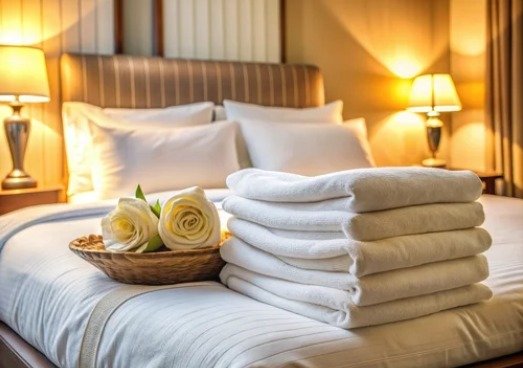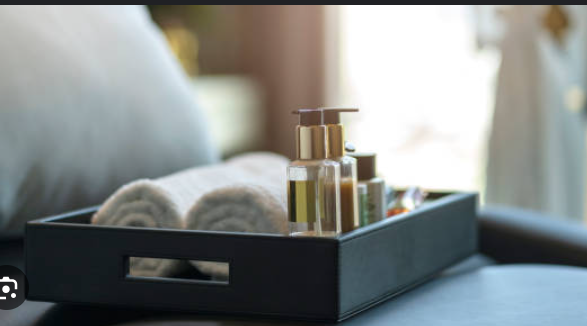Hotel amenities, from the simplest toiletries to high-tech room features, play a crucial role in enhancing guest experiences. These amenities must meet stringent industry standards to ensure quality, safety, and guest satisfaction. Here, we’ll explore how hotel amenities are manufactured, the regulatory requirements they must meet, and the process by which they achieve consistency and excellence.Hotel amenities industry standards.

1. Adherence to Safety and Quality Standards
The manufacturing of hotel amenities involves strict adherence to industry standards and safety protocols. These include:
- Compliance with Health Regulations: Personal care items like shampoos, conditioners, and body lotions must meet specific safety and hygiene standards. This means adhering to regulations set by organizations like the Food and Drug Administration (FDA) or equivalent bodies in other countries, which oversee the ingredients and production processes to ensure guest safety.
- ISO Certification: Many manufacturers of hotel amenities strive for ISO certifications (such as ISO 22716 for cosmetics), which confirm that the production process follows Good Manufacturing Practices (GMP). This certification ensures that products are consistent, safe, and produced under clean conditions.
- Eco-Friendly Standards: As sustainability becomes a key focus in the hospitality industry, manufacturers also align with eco-friendly certifications. Amenities like biodegradable toiletries, refillable dispensers, and eco-conscious packaging must meet standards from organizations such as the Forest Stewardship Council (FSC) or EcoCert.
These quality checks and certifications guarantee that the amenities provided to guests are safe, reliable, and eco-conscious.
2. The Manufacturing Process of Common Hotel Amenities
To better understand how hotel amenities are produced, consider the step-by-step process involved in manufacturing typical items:
- Toiletries and Personal Care Products: The production of shampoo, soap, and lotions starts with the formulation phase, where chemists develop recipes that balance effectiveness with safety. Ingredients undergo rigorous testing for allergens and stability before moving into mass production. Automated machinery mixes, fills, and seals containers to ensure hygiene and consistency.
- Linens and Textiles: Bed sheets, towels, and robes are produced in textile factories where they go through spinning, weaving, and dyeing processes. Manufacturers aim to meet thread count and fabric standards for durability and comfort, ensuring these items hold up through multiple uses and washes.
- Tech-Based Amenities: Items like smart thermostats or touchless room controls are produced using advanced electronics manufacturing. Quality control teams test these devices to meet safety and performance benchmarks, ensuring they are reliable and user-friendly.
By following these processes, manufacturers can deliver high-quality products that meet the needs of hotel chains and their guests.
3. Customization to Meet Brand Requirements
Hotels often require customized amenities that reflect their brand identity and commitment to guest experience. This customization includes:
- Private Labeling: Many luxury hotel chains opt for private-label products that feature custom scents, logos, and unique formulations. Manufacturers collaborate with hotel representatives to ensure these amenities meet brand standards while complying with regulatory guidelines.
- Exclusive Formulas: High-end hotels may work with manufacturers to develop exclusive, signature product lines, such as bespoke bath products or personalized room fragrances. These tailored items set a brand apart and enhance a guest’s perception of quality and luxury.
- Eco-Friendly Initiatives: With sustainability being a growing trend, many hotels commission the production of refillable dispensers, bamboo toothbrushes, and plant-based toiletries. Manufacturers must adapt their processes to use sustainable materials and production techniques while still delivering on quality.
Customization adds a layer of sophistication to hotel amenities and helps hotels differentiate themselves in a competitive market.
4. Ensuring Consistency and Quality Across Batches
Manufacturers must maintain a high level of consistency to meet industry standards and hotel expectations. This involves:
- Batch Testing and Quality Control: Every batch of products goes through rigorous testing to ensure consistency in texture, scent, and efficacy. Quality control checks identify any deviations from the desired specifications.
- Supply Chain Transparency: Reliable manufacturers maintain transparency in their supply chain to ensure that raw materials are sourced ethically and meet regulatory standards. This includes working with vetted suppliers for ingredients, textiles, and packaging materials.
- Feedback Loops and Adjustments: Hotels often provide feedback to manufacturers based on guest reviews and satisfaction surveys. This feedback helps refine product quality and adapt future production runs to meet evolving needs.
Consistency in production helps manufacturers maintain trust with their hotel partners and ensures that guests receive reliable, high-quality amenities.
5. Challenges in Meeting Industry Standards
Despite rigorous manufacturing processes, several challenges arise in maintaining industry standards:
- Ingredient Sourcing Issues: Supply chain disruptions, particularly for natural or organic ingredients, can affect production timelines and quality. Manufacturers must navigate these challenges while adhering to certifications and safety protocols.
- Cost Management: High-quality and eco-friendly production methods often come at a higher cost. Balancing affordability with premium quality is an ongoing challenge for manufacturers and hotel chains alike.
- Regulatory Updates: Industry standards evolve to reflect new research and environmental considerations. Manufacturers must stay informed about changing regulations and adapt their processes to remain compliant.
These challenges require continuous innovation and strategic planning to overcome, ensuring that the end products meet both quality expectations and regulatory requirements.

FAQs
What standards must hotel amenities meet? Hotel amenities must comply with health, safety, and environmental regulations. This includes adhering to FDA guidelines, Good Manufacturing Practices (GMP), and obtaining certifications like ISO 22716 for quality assurance.
Are eco-friendly amenities widely used in hotels? Yes, eco-friendly amenities are increasingly common. Hotels are opting for sustainable products like biodegradable toiletries and refillable dispensers to reduce their environmental impact.
How do hotels ensure the quality of their amenities? Hotels partner with reputable manufacturers that follow strict quality control processes. Batch testing, supplier vetting, and adherence to ISO standards help ensure product quality and consistency.
Do luxury hotels use different amenities than standard hotels? Yes, luxury hotels often provide bespoke or private-label amenities that reflect their brand’s identity. These items may include high-end toiletries, personalized scents, and unique room features.
What are the main challenges in manufacturing hotel amenities? The main challenges include ingredient sourcing, maintaining cost-effectiveness while ensuring quality, and keeping up with changing regulatory standards.
Why is customization important for hotel amenities? Customization helps hotels build brand identity and differentiate their services. Bespoke amenities can enhance guest experience and reinforce the hotel’s commitment to quality and uniqueness.
